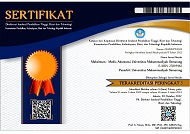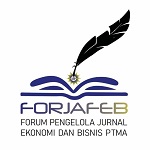Impact of Whistleblowing System Between the Vousinas Fraud Hexagon Theory and Financial Statement Fraud
(1) Universitas Dian NUswantoro
(2) Universitas Dian Nuswantoro
(3) Universitas Dian Nuswantoro
(4) Universitas Dian Nuswantoro
(*) Corresponding Author
Abstract
This study examines and analyses the impact of pressure, opportunity, rationalization, capability, ego, and collusion on financial statement fraud. Testing of the whistleblowing system variable is a moderating variable in the relationship between the fraud hexagon theory variable and financial statement fraud. Purposive sampling resulted in a total of 120 observation data. Data was collected from annual and sustainability reports from 68 state-owned enterprises on the Indonesia Stock Exchange (IDX) in 2019-2022. The data were processed and analyzed using WarpPLS 7.0 software. This research confirms that WBS can reduce the link between pressure and FSF and that pressure directly affects FSF. Any other variables cannot directly or indirectly influence financial statement fraud. The novelty of this research is the whistleblower system variable, which moderates the association between financial statement fraud and the factors of the fraud hexagon theory.
Keywords
Full Text:
PDFReferences
ACFE. (2020). Report to the Nations 2020.
A.C.F.E. (2022). A.C.F.E. 2022 Report to the Nations.
A.C.F.E. Indonesia. (2019). Survei Fraud Indonesia 2019.
Achmad, T., Ghozali, I., & Pamungkas, I. D. (2022). Hexagon Fraud: Detection of Fraudulent Financial Reporting in State-Owned Enterprises Indonesia. Economies, 10(1). https://doi.org/10.3390/economies10010013
Agustina, R. D., & Pratomo, D. (2019). Pengaruh Fraud Pentagon dalam Mendeteksi Kecurangan Pelaporan Keuangan. Jurnal Ilmiah Manajemen Ekonomi Dan Akuntansi, 3(1).
Akbar, D. A., Africano, F., & Isrodinata, R. (2021). Can Fraud Diamond Affect Fraud Financial Statements in Sharia Commercial Banks? Jurnal Reviu Akuntansi Dan Keuangan, 11(1), 40–57. https://doi.org/10.22219/jrak.v11i1.16256
Amyar, F., Rahma, A. E., Alimin Azis, N., & Suwarno, S. (2023). The Effect of Auditor’s Professional Skepticism and Whistleblowing System on Fraud Detection: Evidence from Indonesian Public Sector Audit (Vol. 3, Issue 4).
Anisykurlillah, I., Ardiansah, M. N., & Nurrahmasari, A. (2023). Fraudulent Financial Statements Detection Using Fraud Triangle Analysis: Institutional Ownership as A Moderating Variable. Accounting Analysis Journal, 11(2), 138–148. https://doi.org/10.15294/aaj.v11i2.57517
Ariyanto, R., & Bone, H. (2020). Fraud Awareness in Indonesian Governmental Sector: Multi-Agency Responses. Review of Integrative Business and Economics Research, 9(2), 209–222.
Asmah, A. E., Atuilik, W. A., & Ofori, D. (2020). Antecedents and consequences of staff-related fraud in the Ghanaian banking industry. Journal of Financial Crime, 27(1), 188–201. https://doi.org/10.1108/JFC-03-2019-0034
Astrawan, M. I., & Achmad, T. (2023). Pengaruh Efektivitas Auditor Spesialisasi Industri, Fee Audit, dan Komite Audit terhadap Pendeteksian Kecurangan Pelaporan Keuangan. Diponegoro Journal of Accounting, 12(2), 1–14.
Aulia Haqq, A. P. N., & Budiwitjaksono, G. S. (2020). Analisa teori fraud pentagon sebagai pendeteksi kecurangan pada laporan keuangan. Journal of Economics, Business, & Accountancy Ventura, 22(3). https://doi.org/10.14414/jebav.v22i3.1788
Aviantara, R. (2021). The Association Between Fraud Hexagon and Government’s Fraudulent Financial Report. Asia Pacific Fraud Journal, 6(1), 26. https://doi.org/10.21532/apfjournal.v6i1.192
Avortri, C., & Agbanyo, R. (2021). Determinants of management fraud in the banking sector of Ghana: the perspective of the diamond fraud theory. Journal of Financial Crime, 28(1), 142–155. https://doi.org/10.1108/JFC-06-2020-0102
Bagianto, A., & Hendriyana, H. (2021). Understand the Role of Whistleblowing Systems and Internal Audits on Fraud Prevention. JASa (Jurnal Akuntansi, Audit Dan Sistem Informasi Akuntansi), 5(3), 374–384. https://doi.org/10.36555/jasa.v5i3.1733
Beneish, M. D., Bernard, V., Ciesielski, J., Deangelo, L., Fridson, M., Harvey, C., Hsieh, D., Lee, C., Press, E., Whaley, B., & Zmijewski, M. (1999). The Detection of Earnings Manipulation Comments Welcome.
Bhaktiar, R. E., & Setyorini, A. (2021). The Effect of the Fraud Triangle on Fraud Financial Statements (Case Study on Manufacturing Companies in the Food and Beverage Subsector). Jurnal Mantik, 5(2), 841–847.
Bunga, R. A., Rafael, S. J. M., Dethan, M. A., & Arthana, I. K. (2020). Whistleblowing Systems And Competence Of Internal Auditor For Fraud Prevention. International Journal Of Scientific & Technology Research, 9(2), 2. www.ijstr.org
Chantia, D., Guritno, Y., & Sari, R. (2021). Detection Of Fraudulent Financial Statements: Fraud Hexagon S.C.C.O.R.E. Model Approach. Prosiding B.I.E.M.A., 2, 594–613.
Citranagari, M. P. (2023). The Effect Of Professional Skepticism, Experience Of Investigative Auditors And Whistleblowing System On Auditor's Ability In Detecting Fraud. Journal Research of Social Science, Economics, and Management, 2(1), 72–82. https://doi.org/10.36418/jrssem.v2i1.219
Cressey, D. R. (1953). Other People's Money; A Study of the Social Psychology of Embezzlement.
Crowe, H. (2011). Why the Fraud Triangle is No Longer Enough. Crowe L.L.P.
Damayani, F., Wahyudi, T., & Yuniatie, E. (2017). Pengaruh Fraud Pentagon Terhadap Kecurangan Laporan Keuangan Pada Perusahaan Infrastruktur YangTerdaftar Di Bursa Efek Indonesia Tahun. Akuntabilitas: Jurnal Penelitian Dan Pengembangan Akuntansi, 11(2).
Dihni, V. A. (2022a, March 28). Ada 119 Kasus Korupsi di BUMN Periode 2016-2021. Databoks.
Dihni, V. A. (2022b, March 28). Ini Kelompok Pelaku Korupsi di Lingkungan BUMN. Databoks.
Faradiza, S. A. (2019). Fraud Pentagon dan Kecurangan Laporan Keuangan. EkBis: Jurnal Ekonomi Dan Bisnis, 2(1), 1–22.
Fathmaningrum, E. S., & Anggarani, G. (2021). Fraud Pentagon and Fraudulent Financial Reporting: Evidence from Manufacturing Companies in Indonesia and Malaysia. Journal of Accounting and Investment, 22(3), 625–646. https://doi.org/10.18196/jai.v22i3.12538
Fauziah, F. E. (2022). Financial Statement Fraud Detection with Fraud Triangle Analysis Triangle Analysis. FOKUS EKONOMI: Jurnal Ilmiah Ekonomi, 17(2). http://ejournal.stiepena.ac.id/index.php/fe
Fitri, F. A., Syukur, M., & Justisa, G. (2019). Do The Fraud Triangle Components Motivate Fraud In Indonesia? Australasian Accounting, Business, and Finance Journal, 13(4), 63–72.
Fitriyah, atul, Novita, S., Airlangga, J., Gubeng, K., Surabaya, K., & Riset Akuntansi Kontemporer, J. (2021). Fraud Pentagon Theory For Detecting Financial Statement Fraudulent. 13(1), 20–25. https://journal.unpas.ac.id/index.php/jrak/index
Ghaisani, H. M., Triyono, & Bawono, A. D. B. (2022). Analysis of Financial Statement Fraud: The Vousinas Fraud Hexagon Model Approach and the Audit Committe as Moderating Variable. The International Journal of Business Management and Technology, 6(6). www.theijbmt.com
Hadiani, Y., Rizani, F., & Nailiah, R. (2022). Mekanisme Corporate Governance Sebagai Variabel Moderator Dalam Potensi Kecurangan Laporan Keuangan. Students’ Conference on Accounting & Business.
Handayani, J. R., Nurcahyono, N., Saadah, N., & Winarsih. (2023). Hexagon Fraud: Detection of Fraudulent Financial Statement in Indonesia (pp. 263–276). https://doi.org/10.2991/978-94-6463-154-8_24
Handayani, N., Evana, E., & Prasetyo, T. J. (2022). Determination of Fraudulent Financial Statements in Indonesia. Journal Dimensie Management and Public Sector, 3(2), 1–10. https://hdpublication.com/index.php/jdmps
Handoko, B. L., Putri, R. N. A., & Wijaya, S. (2022). Analysis of Fraudulent Financial Reporting based on the Fraud Heptagon Model in the Transportation and Logistic Industry listed on IDX during the Covid-19 Pandemic. A.C.M. International Conference Proceeding Series, 56–63. https://doi.org/10.1145/3578997.3579003
Hanifah, I. A., & Clyde, V. (2022). The Effect of Whistleblowing System toward Fraud Prevention: Mediation of Forensic and Investigative Audit. A.F.R.E. (Accounting and Financial Review), 5(2), 97–105. https://doi.org/10.26905/afr.v5i2.7530
Hashim, H. A., Salleh, Z., Shuhaimi, I., & Ismail, N. A. N. (2020). The risk of financial fraud: a management perspective. Journal of Financial Crime, 27(4), 1143–1159. https://doi.org/10.1108/JFC-04-2020-0062
Hermansjah, R., Sugiarto, Ugut, G. S. S., & Hulu, E. (2021). The effect of government ownership on Indonesia's state-owned enterprises' (S.O.E.) firm performance. Accounting, 7(6), 1347–1352. https://doi.org/10.5267/j.ac.2021.4.003
Hidayati, N. (2019, June 29). Ditemukan Pelanggaran pada Audit Laporan Keuangan Garuda, Izin AP Kasner Sirumapea Dibekukan. Pusat Pembinaan Profesi Keuangan.
Idris, M. (2021, February 3). Ini Kronologi Korupsi Asabri yang Merugikan Negara Rp 23,7 Triliun. Kompas.Com.
Imtikhani, L., & Sukirman. (2021). Determinan Fraudulent Financial Statement Melalui Perspektif Fraud Hexagon Theory Pada Perusahaan Pertambangan. Jurnal Akuntansi Bisnis, 19(1).
Indrati, M., & Claraswati, N. (2021). Financial Statement Detection Using Fraud Diamond. Journal Research of Social, Science, Economics, and Management, 1(2), 148–162. https://doi.org/10.36418/jrssem.v1i2.13
Jannah, V. M., & Rasuli, M. (2021). Pendekatan Vousinas Fraud Hexagon Model dalam Mendeteksi Kecurangan Pelaporan Keuangan. Studi Akuntansi Dan Keuangan Indonesia, 4(1).
Khamainy, A. H., Amalia, M. M., Cakranegara, P. A., & Indrawati, A. (2022). Financial Statement Fraud: The Predictive Relevance of Fraud Hexagon Theory. Journal of Accounting and Strategic Finance, 5(1), 110–133. https://doi.org/10.33005/jasf.v5i1.249
KNKG. (2008). Pedoman Sistem Pelaporan Pelanggaran - SPP (Whistleblowing System - WBS). www.governance-indonesia.com
Koharudin, A., & Januarti, I. (2021). Lack of Financial Reporting Using Crowe’s Fraud Pentagon Theory. Jurnal Dinamika Akuntansi, 13(2), 148–157. https://doi.org/10.15294/jda.v13i2.28602
Le, T. T. H., & Tran, M. D. (2018). The effect of internal control on asset misappropriation: The case of Vietnam. Business and Economic Horizons, 14(4), 941–953. https://doi.org/10.15208/beh.2018.64
Lionardi, M., & Suhartono, S. (2022). Pendeteksian Kemungkinan Terjadinya Fraudulent Financial Statement menggunakan Fraud Hexagon. Moneter: Jurnal Akuntansi Dan Keuangan, 9(1). http://ejournal.bsi.ac.id/ejurnal/index.php/moneter
Maisaroh, P., & Nurhidayati, M. (2021). Pengaruh Komite Audit, Good Corporate Governance Dan Whistleblowing System Terhadap Fraud Bank Umum Syariah Di Indonesia Periode 2016-2019. Journal of Islamic Banking and Finance, 1(1), 23–36.
Makhmuro, A., & Nurcahya, Y. A. (2023). Literature Review of Audit Investigation Role and Whistleblowing System in Efforts to Fraud Disclosure. Current Advanced Research on Sharia Finance and Economics Worldwide, 2(2). https://ojs.transpublika.com/index.php/CASHFLOW/
Masdiantini, P. R., Devi, S., Purnamawati, I. G. A., & Dewi, P. E. D. M. (2021). Detection of Financial Statement Fraud: In Review of Bystander Effect, Whistleblowing and Locus of Control. Advances in Economics, Business, and Management Research, 197.
Maulida, W. Y., & Bayunitri, B. I. (2021). The influence of whistleblowing system toward fraud prevention. International Journal of Financial, Accounting, and Management, 2(4), 275–294. https://doi.org/10.35912/ijfam.v2i4.177
Meidijati, & Amin, M. N. (2022). Detecting Fraudulent Financial Reporting Through Hexagon Fraud Model: Moderating Role of Income Tax Rate. International Journal Of Social And Management Studies (I.J.O.S.M.A.S.), 3(2). http://www.ijosmas.org
Meiryani, Daniel, Huang, S. M., Lindawati, A., Wahyuningtias, D., Purnomo, A., Winoto, A., & Fahlevi, M. (2023). Systematic Literature Review On Implementation Of Whistleblowing System In Preventing Financial Accounting Fraud. Journal of Theoretical and Applied Information Technology, 15(9). www.jatit.org
Mukaromah, I., & Budiwitjaksono, G. S. (2021). Fraud Hexagon Theory dalam Mendeteksi Kecurangan Laporan Keuangan pada Perbankan yang Terdaftar di Bursa Efek Indonesia Tahun 2015-2019. Jurnal Ilmiah Komputerisasi Akuntansi, 14(1), 61–72. http://journal.stekom.ac.id/index.php/kompakpage61
Mukhtaruddin, M., Chairunnisa, W. Z., Patmawati, P., & Saftiana, Y. (2022). Financial distress, earning management, financial statement fraud and audit quality as a moderating variable: listed companies on the Indonesia Stock Exchange. F1000Research, 11, 1362. https://doi.org/10.12688/f1000research.123525.1
Mulya, A., Rahmatika, D. N., & Kartikasari, M. D. (2019). Pengaruh Fraud Pentagon (Pressure, Opportunity, Rationalization, Competence Dan Arrogance) Terhadap Pendeteksian Fraudulent Financial Statement Pada Perusahaan Property, Real Estate And Building Construction Yang Terdaftar Di Bursa Efek Indonesia Tahun 2014-2018 Akuntansi Keuangan. Pernana: Jurnal Perpajakan, Manajemen, Dan Akuntansi, 11(1).
Nasir, N. A. B. M., Ali, M. J., & Ahmed, K. (2019). Corporate governance, board ethnicity and financial statement fraud: evidence from Malaysia. Accounting Research Journal, 32(3), 514–531. https://doi.org/10.1108/ARJ-02-2018-0024
Nugroho, A. (2020, January 10). Rugi Triliunan, Berikut Kronologi Kasus Asuransi Jiwasraya. Kompas.
Nugroho, D., & Diyanty, V. (2022). Hexagon Fraud In Fraudulent Financial Statements: The Moderating Role Of Audit Committee. Jurnal Akuntansi Dan Keuangan Indonesia, 19(1), 46–67. https://doi.org/10.21002/jaki.2022.03
Nurhidayah, W., & Kusumawati, E. (2023). Analisis Kecurangan Laporan Keuangan Dengan Pendekatan Vousinas Fraud Hexagon Model. INNOVATIVE: Journal Of Social Science Research, 3(4), 8789–8804.
Nurhidayat, I., & Kusumasari, B. (2018). Strengthening the Effectiveness of Whistleblowing: System A Study for Implementing Anti-corruption Policy in Indonesia. Journal of Financial Crime, 25(1), 140–154. https://doi.org/10.1108/JFC-11-2016-0069
Okafor, O. N., Adebisi, F. A., Opara, M., & Okafor, C. B. (2020). Deployment of whistleblowing as an accountability mechanism to curb corruption and fraud in a developing democracy. Accounting, Auditing and Accountability Journal, 33(6), 1335–1366. https://doi.org/10.1108/AAAJ-12-2018-3780
Oktavia, S., Bahari, A., & Kartika, R. (2022). Pengaruh Elemen Fraud Hexagon Theory Terhadap Fraud Laporan Keuangan. Jurnal Akuntansi Dan Ekonomika, 12(2), 275–284. https://doi.org/10.37859/jae.v12i2.4207
Owusu, G. M. Y., Koomson, T. A. A., Alipoe, S. A., & Kani, Y. A. (2022). Examining the predictors of fraud in state-owned enterprises: applying the fraud triangle theory. Journal of Money Laundering Control, 25(2), 427–444. https://doi.org/10.1108/JMLC-05-2021-0053
Ozcelik, H. (2020). An Analysis Of Fraudulent Financial Reporting Using The Fraud Diamond Theory Perspective: An Empirical Study On The Manufacturing Sector Companies Listed On The Borsa Istanbul. In Contemporary Studies in Economic and Financial Analysis (Vol. 102, pp. 131–153). Emerald Group Holdings Ltd. https://doi.org/10.1108/S1569-375920200000102012
Pamungkas, I. D., Wahyudi, S., & Achmad, T. (2020). Whistleblowing System and Fraud Early Warning System on Village Fund Fraud: The Indonesian Experience. International Journal of Environmental Science, 5. http://www.iaras.org/iaras/journals/ijes
Prasetia, I. Y., & Dewayanto, T. (2021). Analisis Pengaruh Fraud Diamond dan Fee Audit terhadap Pengungkapan atas Kecurangan Laporan Keuangan. Diponegoro Journal on Accounting, 10(4), 1–15.
Primayogha, E. (2022, March 21). Kasus Korupsi di Lingkungan BUMN: Marak dan Rawan pada Sektor Finansial. Indonesia Corruption Watch.
Puryati, D., & Febriani, S. (2020). The Consequence of Whistleblowing System and Internal Control toward Fraud Prevention: A Study on Indonesian State Owned Enterprise. International Journal of Business and Technology Management, 2(3), 35–48. http://myjms.moe.gov.my/index.php/ijbtm
Putri, R. S. (2022, August 5). Kasus Kredit Fiktif Rp 2,2 Miliar di Bogor, BRI Berkoordinasi dengan Penegak Hukum dan Jatuhkan Sanksi. TEMPO.CO.
Rachman, F. F. (2020, January 8). Begini Kronologi Kasus Jiwasraya Versi BPK. Detikfinance.
Rahma, N. N., & Sari, S. P. (2023). Detection of Fraud Financial Statements through the Hexagon Model Vousinas Fraud Dimensions: Review on Jakarta Islamic Index 70. International Journal of Latest Research in Humanities and Social Science, 6(1), 152–159. www.ijlrhss.com
Rani, U., Lhaksmi Pramudyastuti, O., & Prativi Nugraheni, A. (2022). Disclosing the practice of whistleblowing system in Indonesia's publicly listed companies. Keuangan Dan Manajemen, 18(18), 80. https://doi.org/10.29264/jinv.v18i0.11241
Ratnasari, E., & Solikhah, B. (2019). Analysis of Fraudulent Financial Statement: The Fraud Pentagon Theory Approach Analisis Kecurangan Laporan Keuangan: Pendekatan Fraud Pentagon Theory. Gorontalo Accounting Journal, 2(2), 98–112.
Reurink, A. (2018). Financial Fraud: A Literature Review. Journal of Economic Surveys, 32(5), 1292–1325. https://doi.org/10.1111/joes.12294
Sagala, S. G., & Siagian, V. (2021). Pengaruh Fraud Hexagon Model Terhadap Fraudulent Laporan Keuangan pada Perusahaan Sub Sektor Makanan dan Minuman yang Terdaftar di BEI Tahun 2016-2019. Jurnal Akuntansi, 13(2).
Sari, M. P., Kiswanto, Rahmadani, L. V., Khairunnisa, H., & Pamungkas, I. D. (2020). Detection of Fraudulent Financial Reporting And Corporate Governance Mechanisms Using Fraud Diamond Theory Of The Property And Construction Sectors In Indonesia. Humanities & Social Sciences Reviews, 8(3), 1065–1072. https://doi.org/10.18510/hssr.2020.83109
Sasongko, N., & Wijayantika, S. F. (2019). Faktor Resiko Fraud Terhadap Pelaksanaan Fraudulent Financial Reporting (Berdasarkan Pendekatan Crown’s Fraud Pentagon Theory). Riset Akuntansi Dan Keuangan Indonesia, 4(1).
Septiningrum, K. E., & Mutmainah, S. (2022). Analisis Faktor Yang Mempengaruhi Terjadinya Financial Statement Fraud: Perspektif Fraud Hexagon Theory. Diponegoro Journal Of Accounting, 11(3), 1–13. http://ejournal-s1.undip.ac.id/index.php/accounting
Septriani, Y., & Handayani, D. (2018). Mendeteksi Kecurangan Laporan Keuangan dengan Analisis Fraud Pentagon. Jurnal Politeknik Caltex Riau, 11(1), 11–23. http://jurnal.pcr.ac.id
Sidik, S. (2021, March 4). Megaskandal Asabri Rp 23 T, Korupsi Terbesar dalam Sejarah RI. CNBC Indonesia.
Sihombing, T., & Panggulu, G. E. (2022). Fraud Hexagon Theory And Fraudulent Financial Statement In I.T. Industry In Asean. Jurnal Reviu Akuntansi Dan Keuangan, 12(3), 524–544. https://doi.org/10.22219/jrak.v12i3.23334
Siregar, E. S., Sari, G., & Arsa, A. (2022). Fraud at Islamic Commercial Banks in Indonesia is Seen in Good Corporate Governance (G.C.G.) and a Whistleblowing System. MALIA: Journal of Islamic Banking and Finance, 6(2), 117. https://doi.org/10.21043/malia.v6i2.14627
Situngkir, N. C., & Triyanto, D. N. (2020). Detecting Fraudulent Financial Reporting Using Fraud Score Model and Fraud Pentagon Theory: Empirical Study of Companies Listed in the L.Q. 45 Index. The Indonesian Journal of Accounting Research, 23(03). https://doi.org/10.33312/ijar.486
Skousen, C. J., & Smith, K. R. (2009). Detecting and predicting financial statement fraud: The effectiveness of the fraud triangle and S.A.S. No. 99. Advances in Financial Economics, 13, 53–81. https://doi.org/10.1108/S1569-3732(2009)0000013005
Sow, A. N., Basiruddin, R., Mohammad, J., & Rasid, S. Z. A. (2018). Fraud prevention in Malaysian small and medium enterprises (S.M.E.s). Journal of Financial Crime, 25(2), 499–517. https://doi.org/10.1108/JFC-05-2017-0049
Srikandhi, M. F., & Suryandari, D. (2020). Accounting Analysis Journal Audit Quality Moderates the Effect of Independent Commissioners, Audit Committees, and Whistleblowing Systems on the Integrity of Financial Statements. Accounting Analysis Journal, 9(3), 186–192. https://doi.org/10.15294/aaj.v9i3.41625
Sudjono, A. C. (2023). Do Good Corporate Governance and Whistleblowing Systems in the Bank Industry Effectively Support Fraud Detection and Prevention? Asia Pacific Fraud Journal, 8(1), 155. https://doi.org/10.21532/apfjournal.v8i1.296
Sunardi, & Amin, S. N. (2018). Fraud Detection of Financial Statement by Using Fraud Diamond Perspective. International Journal of Development and Sustainability, 7(3), 878–891. www.isdsnet.com/ijds
Susandra, F., & Hartina, S. (2017). Analisis Faktor-Faktor Yang Mempengaruhi Kecenderungan Fraud Pada Satuan Kerja Perangkat Daerah (SKPD) Di Kota Bogor Analysis Factors Influencing Tendency Of Fraud There Is Set Of Job Peripheral Of Area (SKPD) In Town Of Bogor. Jurnal Akunida, 3(2).
Syahria, R., Kusumawati, F., & Ervanto, A. D. (2019). Detecting Financial Statement Fraud Using Fraud Diamond (A Study on Banking Companies Listed On the Indonesia Stock Exchange Period 2012-2016). Asia Pacific Fraud Journal, 4(2). https://doi.org/10.21532/apfjournal.v4i2.114
Syifani, P. A. (2021). Preventive Detection System Pada Kecurangan Laporan Keuangan Berbasis Hexagon Fraud Analysis (Studi Empiris pada Perusahaan BUMN yang terdaftar di Bursa Efek Indonesia Tahun 2015 – 2019). Universitas Islam Indonesia.
Theotama, G., Denny Waskita, Y., Nugrahesthy, A., & Hapsari, S. (2023). Fraud hexagon in the motives to commit academic fraud. Jurnal Ekonomi Dan Bisnis, 26(1), 195–220. www.ejournal.uksw.edu/jeb
Triantoro, H. D., Utami, I., & Joseph, C. (2020). Whistleblowing system, Machiavellian personality, fraud intention: An experimental study. Journal of Financial Crime, 27(1), 202–216. https://doi.org/10.1108/JFC-01-2019-0003
Ulimsyah, U., Mursalim, M., Su’un, M., Ahmad, H., & Hajering, H. (2021). Whistleblowing’s Effectiveness in Preventing Fraud through Forensic Audit and Investigative Audit. Point of View Research Accounting and Auditing, 2(1), 81–91. https://doi.org/10.47090/povraa.v2i1.116
Vousinas, G. L. (2019). Advancing theory of fraud: the S.C.O.R.E. model. Journal of Financial Crime, 26(1), 372–381. https://doi.org/10.1108/JFC-12-2017-0128
Wahyulistyo, F., & Cahyonowati, N.-. (2023). Determining Factors of Asset Misappropriation Tendency by Employees in Perspective of Fraud Hexagon Theory. Jurnal Dinamika Akuntansi, 15(1), 52–67. https://doi.org/10.15294/jda.v15i1.42090
Wolfe, D. T., & Hermanson, D. R. (2004). The Fraud Diamond: Considering the Four Elements of Fraud. The C.P.A. Journal, 74(12), 38–42.
Yusrianti, H., Ghozali, I., Yuyetta, E., Aryanto, & Meirawati, E. (2020). Financial statement fraud risk factors of fraud triangle: Evidence from Indonesia. International Journal of Financial Research, 11(4), 36–51. https://doi.org/10.5430/ijfr.v11n4p36
Zakaria, N. B., & Mohammed, N. F. (2021). The Influencing Factors of Employee Fraud in Malaysia Financial Institution: The Application of the Fraud Pentagon Theory. In Article in Academy of Strategic Management Journal (Vol. 6). https://www.researchgate.net/publication/353322388
Article Metrics
Abstract view : 192 timesPDF - 1 times
DOI: https://doi.org/10.26714/mki.14.1.2024.114-135
Refbacks
- There are currently no refbacks.
-----------------------------------------------------------------------------------------------------------------------------------------------------------------------------------
 | MAKSIMUM: Media Akuntansi Universitas Muhammadiyah Semarang |
![]()
Maksimum: Media Akuntansi Universitas Muhammadiyah Semarang is licensed under a Creative Commons Attribution Attribution-NonCommercial-NoDerivatives 4.0 International License.

















